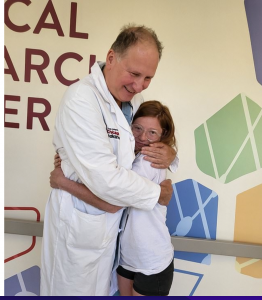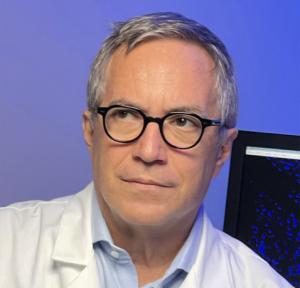First 5 Patients with 'Brittle' T1D are Insulin-Free

Marlaina Goedel, now insulin independent for 14 months, says her surgeon, Piotr Witkowski MD, Ph.d., gave her her life back. She no longer goes to sleep wondering if she'll wake up in the morning.
Breaking News from 2025 Congress of Cell Transplantation and Regenerative Medicine Society
TOKYO, JAPAN, October 27, 2025 /EINPresswire.com/ -- At the 2025 Congress of the Cell Transplant and Regenerative Medicine Society Saturday, world-renowned expert Dr. Camillo Ricordi presented the cases of five patients with type 1 diabetes who received an experimental anti-rejection drug, Tegoprubart, with their islet cell transplant. Within weeks, these patients no longer required insulin injections to artificially control their blood sugar levels. A sixth patient reduced his insulin requirement from 90 units a day to only 10 after a supplemental infusion 3 days ago. He is expected to be insulin-free shortly.
All trial participants were classified as “brittle,” characterized by severely unstable blood sugars that are poorly controlled with standard insulin, resulting in frequent episodes of hyperglycemia and hypoglycemia. No patient experienced any side effects — no infections, blood clots, organ toxicity — with the earliest patients remaining healthy and insulin-free for 14 months.
The pilot trial was conducted by Piotr Witkowski, MD, Ph.D., at the University of Chicago Transplant Institute in collaboration with the Diabetes Research Institute at the University of Miami Miller School of Medicine. At its core was the test of Tegoprubart, a novel monoclonal antibody (anti-CD40L) to see if it could prevent rejection, safely and effectively block immune cell activation without harming the newly transplanted insulin-producing cells or the kidneys.
For decades, scientists have been searching for an alternative to the long-standing standard of care immunosuppressant, tacrolimus, which has been associated with substantial adverse side effects, including harm to the graft and organ toxicity. "This is the first time we’ve been able to demonstrate that islet transplantation can provide lasting insulin independence without tacrolimus,” said Dr. Witkowski, adding, “Tegoprubart has shown excellent safety and tolerability."
"These results validate decades of work to make islet transplantation safer and more widely accessible,” said Camillo Ricordi, MD, Director of the Cell Transplant Center and Director Emeritus of the Diabetes Research Institute at the University of Miami Miller School of Medicine. “This could finally bring us closer to a biological cure for T1D without chronic recipient immunosuppression. Replacing the most toxic anti-rejection drug was an important step in this direction.”
A key objective for both researchers has been to eventually eliminate the necessity for toxic anti-rejection medications in transplant protection. The goal is to induce immunologic tolerance — often referred to as the Holy Grail of transplantation.
The clinical trial at the University of Chicago was initially funded by The Cure Alliance and Breakthrough T1D (formerly the JDRF). Due to it's remarkable success, the pilot study is now quickly expanding enrollment. Dr. Ricordi will serve as Principal Investigator at the University of Miami, where he says, “For the first time in islet transplantation, subjects previously excluded, those with high daily insulin requirements and diabetic nephropathy, will now be permitted to participate, significantly expanding the patient population able to access this potentially transformative therapy.
An islet cell transplant is a straightforward procedure that takes approximately one hour. During this procedure, donor islet cells are infused into the recipient’s liver’s small blood vessels through a catheter. Tegoprubart tricks the immune system to think the body has produced the
islet cells on its own, thereby preventing rejection. Tegoprubart has demonstrated robust graft survival and strong functional outcomes while minimizing toxic risks. Tegoprubart is owned and developed by Eledon Pharmaceuticals in Irvine, California.
The groundbreaking anti-CD40L immunotherapy is actually the second generation of a drug which was tried and abandoned decades ago. Ironically, it was Dr. Ricordi and his colleague, Dr. Norma Kenyon who first developed the novel strategy to prevent rejection of transplanted islets using “anti-CD40L” antibodies to replace tacrolimus and its feared side effects. This novel antibody first demonstrated absence of toxicity, and significantly increased insulin secretion from transplanted islets. But the researchers soon learned of an unexpected side effect: thromboembolism, life-threatening blood clots. All human trials were immediately halted and it appeared to be the end of an entire direction of research. But as often happens in scientific discovery, the halt shaped the field; complications of the past forced a redesign and a reboot. Ricordi and Kenyon continued to analyze and re-think and collaborate with industry innovators for years. Finally, Eledon Pharmaceuticals. Inc., developed an improved version of an anti-CD40L anti-body, the second generation called Tegoprubart.
Which brings us to Dr. Witkowski’s patient number one, Marlaina Goedel, 30. the first human to have an islet cell transplant using the new incarnation, Tegoprubart. Ms. Goedel was diagnosed with Type 1 diabetes (TD1) at the age of 5 and spent a considerable amount of time in hospitals. She struggled with T1D as an adult; a sudden and severe blood sugar drop caused her to faint while driving and crash her car into a wall. Her personal turning point came not long after when her young daughter discovered her unconscious on the kitchen floor in the middle of the night, on her way to the refrigerator for something to eat or drink to raise her blood sugar. This prompted the young mother to search for help and enroll in Dr. Witkowski’s transplant trial. She continued taking insulin for days after the July 2025 transplant with Tegoprubart. Then, as the newly transplanted islet cells began to function, Ms.Goedel’s insulin requirements decreased progressively. Within just four weeks, she no longer required any insulin, prompting Dr. Witkowski to call her on August 15th to instruct her to stop taking insulin, that she was cured. “Tell your family, go enjoy your life.” And she has. After taking insulin for 25 years, Marlaina Goedel no longer needs the 24/7 monitoring and control of what she eats and what she must inject. “I finally have freedom from the nightly fear that I might not wake up the next morning.”
Ricordi, who has been at the forefront of scientific innovation for 40 years, arranged for Ms. Goedel to fly to Miami so that he and Dr. Norma Kenyon could meet the first individual to benefit from their years of research, the trials and errors.
“Dr. Witkowski and Dr. Ricordi, the scientists are my heroes. They restored my life,” Marlaina Goedel expressed after touring the Diabetes Research Institute in Miami. In response, Drs. Ricordi and Witkowski assert that the patients who courageously participate in clinical trials, before safety and efficacy have been established, are the true heroes.
Ricordi’s Tokyo seminar also served as a call to arms. Diabetes affects 589 million adults globally, a significant increase from 171 million in the year 2000. “The urgency is now,” Dr. Ricordi said, “diabetes-related health care costs have topped $1 trillion and are still surging. Last year there were 3.4 million deaths due to diabetes, 1 every 9 seconds.”
Ricordi was also reassuring about the rapid advancements in cell therapies that are profoundly reshaping the landscape of transplantation and regenerative medicine for diabetes treatment. He explored other bold new strategies which eliminate the need for human donors, which has limitations. Vertex Pharmaceuticals, Inc., is one of several using lab-grown insulin-producing beta cells derived from stem cells —a scalable solution, offering an endless supply, that could open transplantation to all people with type 1 diabetes, not just brittle cases. However, In their advanced stem cell–derived trials, patients are still receiving standard-of-care tacrolimus, which is toxic to both islets and kidneys. Pairing stem cell–derived islets with Tegoprubart’s anti-CD40L protection (not yet approved for wide use) could change the paradigm, enabling safer, more durable, and more widely available cures for T1D. (Ricordi served as steering committee chair for one of Vertex's clinical trials.)
Also explored in the seminar: the use of gene-edited, hypoimmune, and iPSC-derived cell products, plus co-transplantation of insulin-producing islet organoids, with micro-gels containing a molecular signal that eliminates activated immune cells at the transplant site.
Ricordi says the focus must now go beyond “the cure” and include diagnosis and prevention, reversal of disease progression in its initial phases, treatment of those already affected, and prevention of disease recurrence.
Shelley Ross is the President of The Cure Alliance, a 501(c)(3) non-profit working to end human suffering by helping scientists cure/ prevent chronic, debilitating, and fatal diseases. The Cure Alliance is a sponsor of the XVIII Congress of the Cell Transplant and Regenerative Medicine
Society in Tokyo.
Shelley Ross
The Cure Alliance
shelleyzross@thecurealliance.org
Visit us on social media:
LinkedIn
YouTube
Other
First patient "cured" of diabetes with new treatment visits the pioneering scientists
Legal Disclaimer:
EIN Presswire provides this news content "as is" without warranty of any kind. We do not accept any responsibility or liability for the accuracy, content, images, videos, licenses, completeness, legality, or reliability of the information contained in this article. If you have any complaints or copyright issues related to this article, kindly contact the author above.


